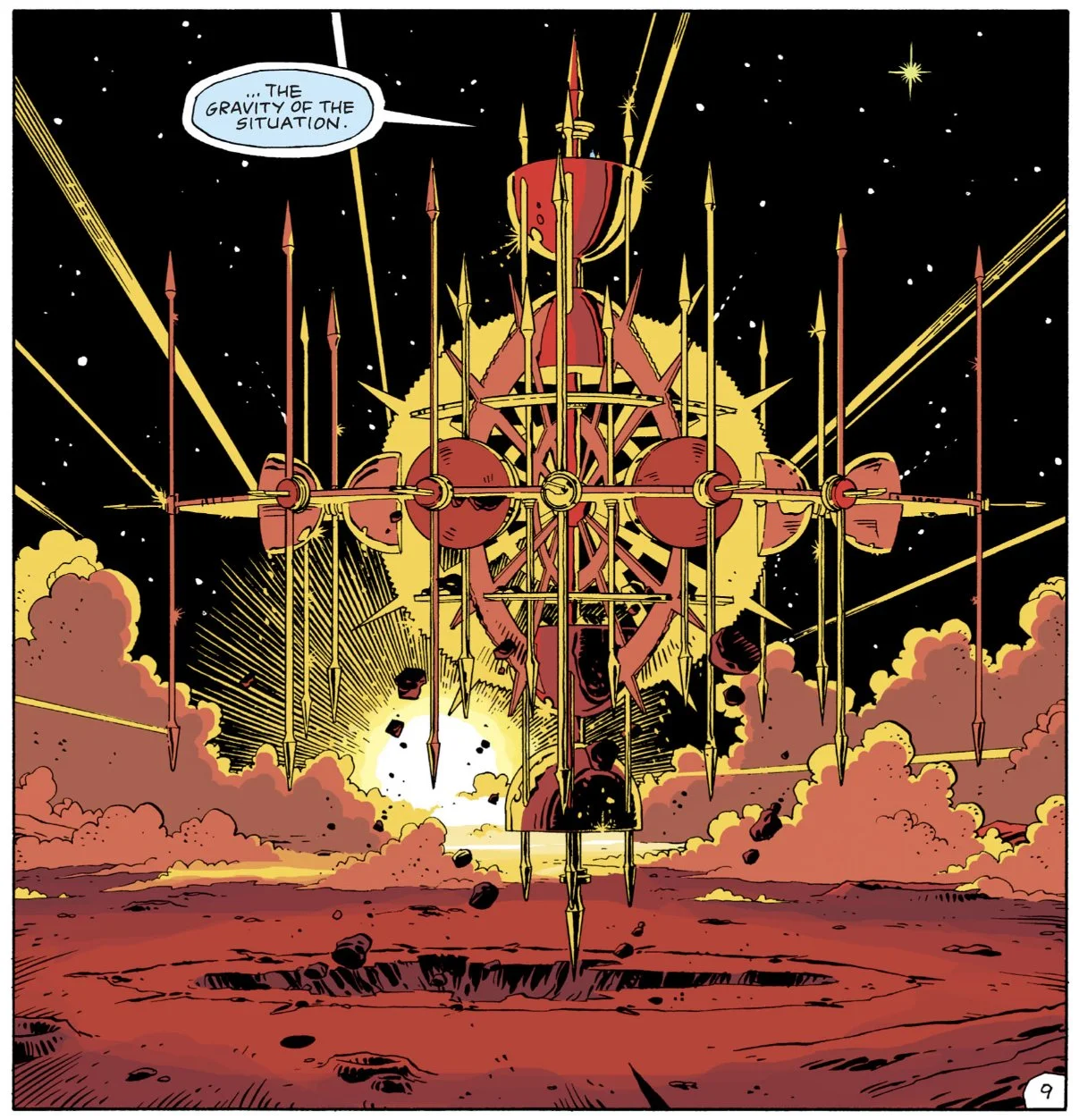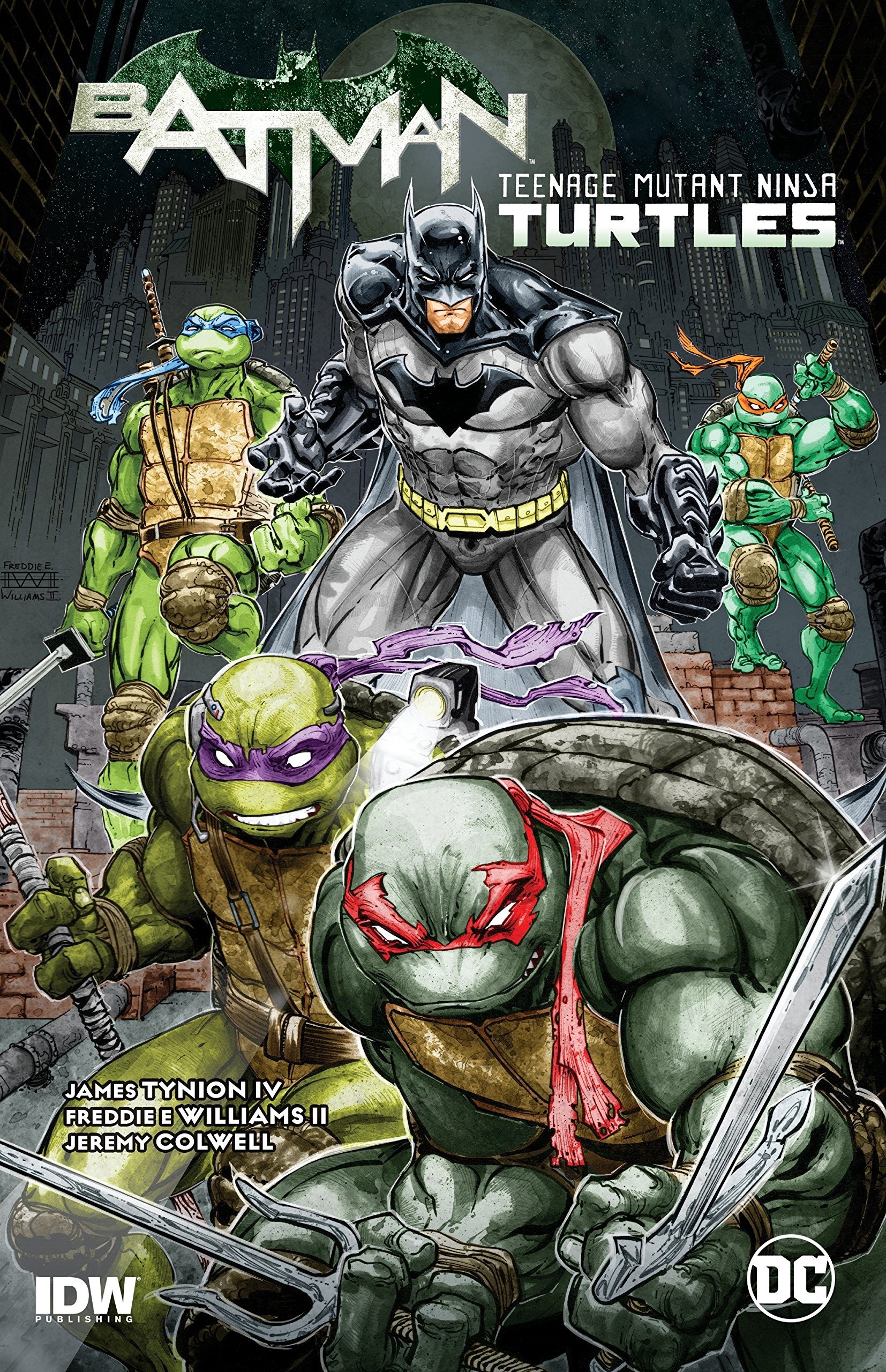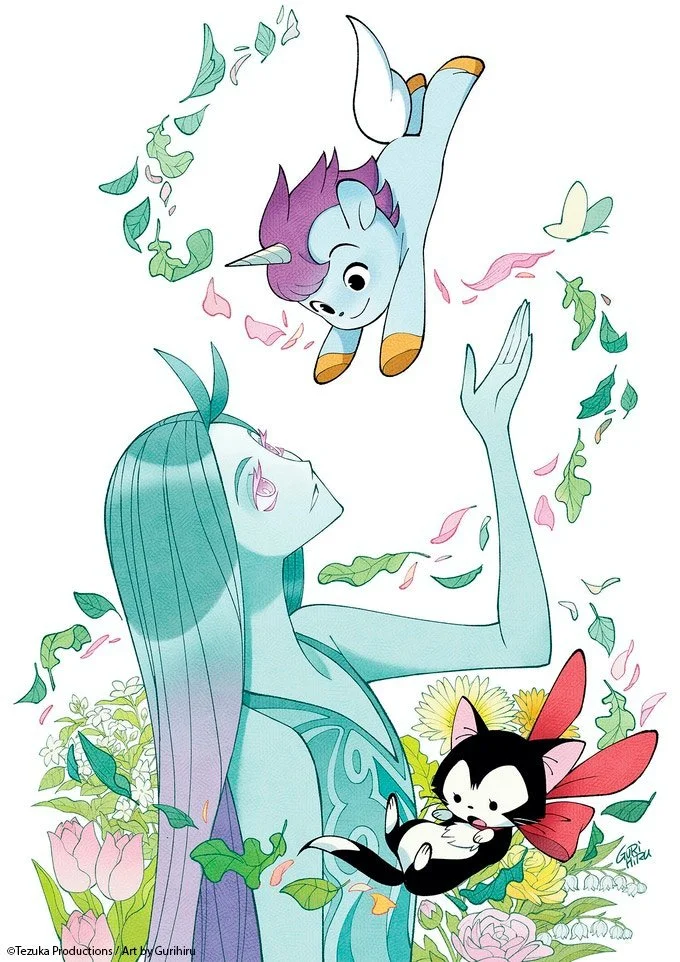Comics Comparisons: Living and Dying in The Wicked + The Divine and The Good Place
By Keigen Rea — The first episode of The Good Place aired on September 19, 2016, and the last episode aired on January 30, 2020. The first issue of The Wicked + The Divine released on June 18, 2014, and the last issue was released September 4, 2019. This is noteworthy to establish that these stories are contemporaries in many ways, arriving at essentially the same time within popular culture. Timing aside, the most noticeable overlap between The Wicked + The Divine comic book and the TV sitcom The Good Place is how both of them talk about and revolve around death.
The Wicked + The Divine and The Good Place: Part One
When The Good Place begins, most of the main cast are dead. The opening scene shows Eleanor being given the news that she’s arrived in The Good Place. For this show, death is the beginning. However, the series mostly uses the post-lives of the characters as an engine for story. It rarely interacts with the idea that their deaths had any real meaning, aside from creating humor from the circumstances.
WicDiv, for the most part, treats death in far more complex ways. There are murders (so many murders) but, for the most part, they all serve different narrative purposes. Some are cathartic, others are gut-wrenching, but mostly, they’re a mix of both. Beyond murders, there are suicides, sacrifices, patricides and at least one incident of cannibalism. However many ways there are murders, none are played for laughs, which, I mean, yeah, that’s probably normal.
Even at the end of each respective series, their treatments of death are vastly different. WicDiv closes on the funeral of a dear friend, posthumously delivering a speech affirming both her and her friend’s lives, eulogizing tearfully about the joy and sadness that living brings. The Good Place ends on a different note, with the main cast earning what is effectively immortality, but each choosing to end their time in the afterlife, proclaiming that death is what gives life meaning.
In many ways, these stories are about the same thing, and yet, they land on vastly different ends.
The Wicked + The Divine and The Good Place: Part Two
The vast gulf between the actual deaths of WicDiv and The Good Place is difficult to easily demonstrate, as you really have to experience them to understand. In one, cast members die from being hit by a boner truck, suffocating in a safe, being crushed by a statue of their sister, and being crushed by an A/C unit. In the other, it’s mostly beheadings — or apparent beheadings — or, as I mentioned earlier, cannibalism, which, yeah, still wild.
The disconnect isn’t primarily in the act of dying though, it’s also in the characters’ treatment of it, in particular, Baal and Baphomet’s vs. the entirety of the Good Place show.
In many ways, the discussion of Baal, Baphomet, sacrifice, suicide, and masculinity is the topic of a different piece altogether — one I may pitch and/or write one day — but what I’d like to examine in this context is their interaction with each other and with the overlap it all shares with The Good Place.
Baal sacrifices children. He does so as a ritual to keep evil monsters from killing more people. He also plans another ritual sacrifice, involving 20,000 people in an arena. The rituals Baal creates and enacts are one way that WicDiv contextualizes its many views on death, and most importantly shows the significance it has on both the characters and the fiction.
Baphomet does not sacrifice other humans for any cause. Instead, a large part of his ending is an act of devotion to his deceased lover. Near the end of the series, Baphomet finishes a temple that was meant for himself and The Morrigan, which stands as a declaration of their tragic relationship. In action, it’s incredibly toxic, but at face value, it stands to show the importance and value that death has in this universe. While death is not itself worshipped here, in some ways it is being worshipped through Baphomet’s godly work.
Ultimately, though, these actions and events only really have thematic meaning. Baal’s sacrifices didn’t actually do anything; Baphomet’s work only made for a cool setting late in the story. The meaninglessness is the point, which itself is meaningful.
When we turn to The Good Place, we see that four deaths are some of the most important events in the history of the universe.
The main cast of The Good Place die, and from within the afterlife, they instigate a series of events that ultimately lead to the liberation of the vast majority of humanity. It is literally impossible to underscore the impact that Eleanor, Jason, Tahani, and Chidi’s deaths had on human history.
In this way, The Good Place ritualizes — no, gives significance — to death in a way that WicDiv never really does. It makes four deaths into the foundation of the new system of the afterlife, cementing them as vital to the human race.
The Wicked + The Divine and The Good Place: Part Three
Another comparison I find fascinating between the two works is the treatment of death by Ananke vs the “cockroaches” treatment of it.
For Ananke, death is something to fear. It is an enemy, an ending to her story, one that she wishes to have full control over. She murders and tortures countless people to keep it at bay; she murders her sister, friends, and family to avoid it. Even at the end, she does all she can to escape death’s embrace, from mind control to groveling for mercy.
The cockroaches, on the other hand, simply walk through a door.
In the penultimate episode of the sitcom, the saviors of the afterlife come up with a new invention, their perfect fix to their almost perfect immortality: death. They reason that the current residents of The Good Place were not experiencing perfection because they didn’t have the most important ingredient to life, and thus invented a way to end it willingly and painlessly. They invented the suicide door.
Now, for the most part, I’m a defender against this particular criticism of the show. I think, thematically, The Good Place does subtly reinforce the idea that death has meaning, and that it’s ending is far more about depicting death in as positive way as possible rather than choosing to argue the merits of suicide. The ending ultimately works for me, both as a thematic cap, as a way to end the series, and as a way to make me bawl my eyes out.
However, it also demonstrates a perspective on death that is absolutely wild to me, and far less complex than that of WicDiv. Death at the end of The Good Place is what gives life meaning, according to it, we all live to die. Where it waxes poetic about death is frankly beautiful, but ultimately I don’t vibe with one of its core philosophies, and it’s a rare case where I gotta go with my 6,000 year old girl on this one.
The Wicked + The Divine and The Good Place: Part Four
The ”one way to end a story,” of course, is with “the end,” but one of the easiest ways to end a story, is with death. Which both series do, and in my opinion, they both do well. As has been discussed though, they’re not exactly in agreement.
For WicDiv, death is extremely complicated, but it isn’t happy. The final issue takes place at Cass’s funeral, 40 years after the last issue, with all the mourning you’d expect. There is a little joy in the collecting of friends, but at its core, it’s a tearful affair.
The Good Place ends with not one, but four different funerals, or rather, celebrations of (after)life. These, also, are sad. Chidi’sis delayed by Eleanor begging him not to go, and eventually asking him to leave while she’s asleep, so she doesn’t have to say goodbye. While this is still all very sad and affecting, there is an air of completion and peace about it.
The finale says that these people cannot walk through the door unless they are ready to, and each one states that they are ready to during the episode. Again, this series posits, albeit very late in the story, that death gives life meaning, which means, the ultimate meaning to life is to die with meaning. To die on one's own terms, after achieving everything one could possibly imagine? There’s a certain romance about that idea that the episode taps into and uses, quite effectively.
And yet, WicDiv’s finale feels more fully formed, and more true to its overall story than The Good Place’s ending. It isn’t perfect — I think it tries too hard in some areas — but thematically, it’s thoughts on death work perfectly as an end note to the series.
The Wicked + The Divine and The Good Place: Part Five
Where the two series diverge the most, however, is on the topic of life.
In many ways, the story of WicDiv is one where Laura Wilson repeatedly chooses to live even though it takes time for her to figure out the correct way to do so. Other characters have a harder time with this. Ananke, for thousands of years, chooses, not to live, but to simply not die, her millennia passing while she flees death rather than pursuing life. Baphomet chooses to sacrifice himself to save a friend, Baal does so to end an enemy.
Importantly, all these characters had the choice, and there are others I’m not naming because I’m lazy, but they all made a choice along these lines. The characters in The Good Place, however, don’t really do so.
The humans, of course, die in mostly meaningless ways the first time, then get resurrected (without their permission), die again because they were being attacked, and ultimately choose to die again. Janet is rebooted against her will some number of times, and can’t die, so instead watches all her friends choose death while he remains. The sole character to choose life is the reformed demon Michael, and even for him, it is offered as a gift, rather than something he pursues.
To me, all this shows the way that The Good Place almost fetishizes death as a concept, while WicDiv actually spends most of its time discussing it and working through it. Which makes perfect sense, as WicDiv writer Kieron Gillen has stated that this is a fundamental part of what the series was about for him as a creator and where he was in his life when writing it.
The Good Place just doesn’t seem to have that. I feel like I’ve criticized it quite a bit across this piece, and it absolutely deserves it, but in truth, I love the show. It’s one of my favorite shows, maybe a favorite piece of entertainment across any medium! When compared against WicDiv, though, it falls short, at least in this particular way. Really, it makes sense, because while the show uses death as a springboard for plot, the comic uses death in ways both literal and figurative, simple and abstract. WicDiv simply spends more time talking about death, and does so in different, interesting ways, while The Good Place, even while surrounded by and interested in it, never reaches the depths that it could have.
“Just because you’re immortal doesn’t mean you’ll live forever,” is the general tag line for The Wicked + The Divine. Funny how that works.
Follow Keigen Rea on Twitter @prince_organa.












